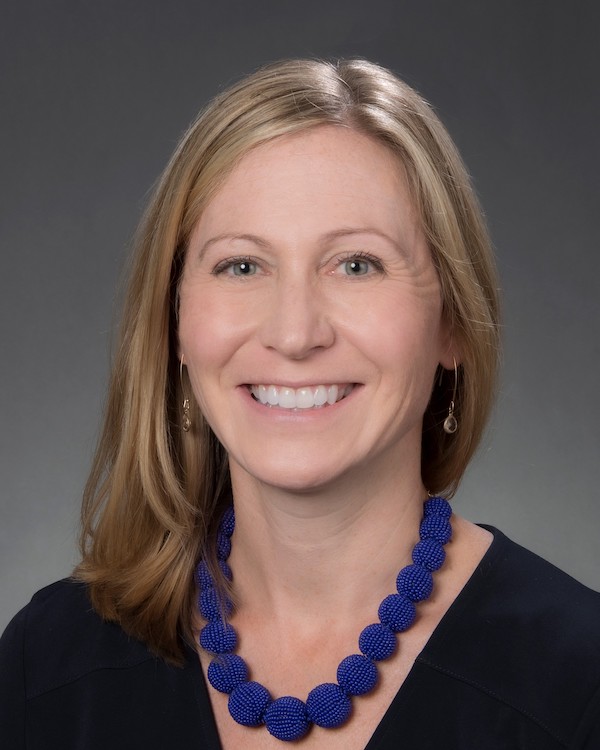
Alison Bradywood (HSERV MPH ‘07) has held numerous leadership positions in health care. In her 19 years at Virginia Mason, Bradywood served as the Nursing Director, Senior Director of Clinical Quality and Practice, and Chief Nursing Officer. While on the faculty at the School of Nursing, she published numerous peer-reviewed articles on subjects like COVID-19 interventions and screening for social determinants of health. Bradywood has also volunteered with the Seattle King County Clinic, and published a letter in The Seattle Times rejecting a “one-size-fits-all approach” to the ongoing nursing shortage.
In May 2023, Bradywood started a new position as the Executive Director of the Washington State Board of Nursing. She has continued to advocate for nurses and patients in this role, including by drafting the HB 2416: Advanced Practice Registered Nurse Title Protection, which Governor Inslee signed into law on April 3rd.
We recently caught up with Alison to discuss her career, accomplishments, and her perspective on challenges facing the nursing profession.
What inspired you to make the leap from health care consulting and teaching at the School of Nursing to leading the Washington State Board of Nursing?
Following the pandemic, I have been more focused on how to make a difference in nursing and health care. There were two events that I clearly recall being integral to my transition. First, in speaking to my students about advocacy and nursing leadership, I began to question if I was doing all that I could to impact nursing. I realized that I needed to do more to contribute to positive change in our state and our profession. Secondly, I had been watching the posting with the Board of Nursing (BON) for a number of months and had asked board consultant, Margaret Holm, JD, RN, to speak to my nursing students in Fall 2022. By the end of her talk, I was thrilled with the potential impacts that working with the board offered and applied for the job. It has been a fantastic learning experience and humbling to step into a different area of health care, and one that has the potential for continuing excitement, diversity of issues, and long-term impact.
What unique challenges are nurses in Washington State facing today?
The challenges that are commonly discussed in nursing are workforce shortages and burnout. I would offer that rather than a workforce crisis, we have a vacancy crisis illustrated by a high number of nursing position vacancies without nurses interested in filling those roles in the traditional way. We need to continue to look at innovative models of staffing, care delivery, reimbursement, and support for nurses throughout their careers to better align patient needs with our workforce needs and assist nurses to continue to have purpose and impact within their care settings. Across health care, we have opportunities to examine the barriers that we are putting in place in our hiring practices, how we put together our health care teams, and of course, our regulations to minimize historic elements that do not enhance the nursing or patient experience. Health care policy provides the foundation to support change in these areas, yet it will take partners across our industry to provide new solutions to care delivery.
Why is HB 2416 important, and how will it help nurses across Washington state?
The Board of Nursing drafted this first successful request legislation in advance of the 2024 legislative session. The bill offers a simple change to advance practice titles, changing Advanced Registered Nurse Practitioner (ARNP) to Advanced Practice Registered Nurse (APRN) in alignment with the national standard. (Previously, Washington was one of only nine other states that used a title other than APRN.) The aim is to support nurse mobility across state lines through the nurse licensure compact and for those on military assignments, as well as the public in having standard language to refer to advanced practice nurses. While this does not go into effect until 2027, the board will be supporting education to insurers, employers, licensees, nursing programs, and patients over the coming months.
What are your priorities right now, as the Director of the Washington State Board of Nursing?
The board has several priority areas: 1) implementing recent legislation including title protection for advanced practice nurses to use Advanced Practice Registered Nurse (APRN) in alignment with the national standards; 2) Enhancing the nursing pipeline through a variety of efforts to expand training opportunities and outreach. Recently, this has included outreach to high schools to encourage entry into the nursing profession starting with nursing assistant certification and financial incentives for nurse preceptors that train nursing students; 3) Supporting and retaining the current workforce. Recent legislative efforts include the nurse licensure compact, reducing stigma for nurses experiencing substance use, and looking at new methods to support growth/development to diversify nursing experience into areas other than direct care in order to retain them within the profession, and looking at how to partner across the community to best support nurses’ mental health.